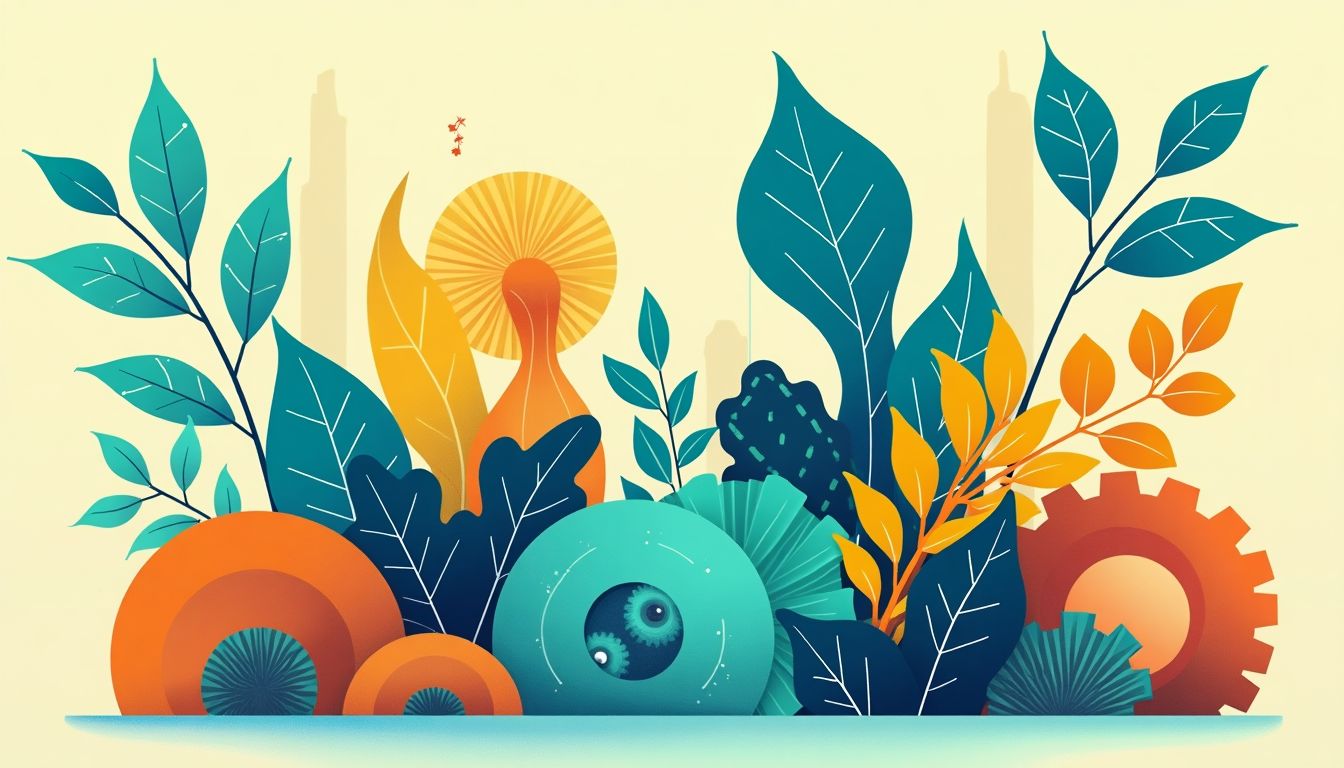Introduction: The Paradox of Prosperity
The only thing we have to fear is fear itself. - Franklin D. Roosevelt This iconic quote serves as a poignant reminder that the true obstacle often resides in our minds. In the context of a rapidly changing world, where automation and artificial intelligence promise to reduce our hardships, it begs the question: can we thrive without the challenges that traditionally drive personal and societal growth? Much like a superhero without their arch-nemesis, what's the true potential of growth if struggle is stripped away?
As we navigate the paradox of a future brimming with ease and comfort, we must consider whether the absence of struggle could lead not to utopia, but to stagnation. Historical figures like Viktor Frankl, who explored the psychological significance of meaning through suffering, along with creativity champions like Maya Angelou and Albert Einstein, conveyed that the essence of human triumph often arises from overcoming challenges. If struggle has historically forged our character and creativity, what happens when ease takes the wheel? Is a life devoid of labor a shortcut to happiness, or merely an invitation to a new set of existential dilemmas?
The quest for understanding growth in a post-work society isn’t merely an academic exercise; it’s a journey into the depths of what it means to be human. Can we unlock new realms of creativity and fulfillment without the crucible of hardship? Or will we find ourselves wandering aimlessly in a sea of comfort, longing for purpose? As we set sail into this murky yet captivating territory, the pressing question lingers: will our future be marked by unprecedented growth or unprecedented complacency?
1. The Historical Role of Struggle in Human Progress
The narrative of human history is one of overcoming challenges. From the invention of the wheel to the Industrial Revolution, every leap forward has been a testament to resilience in the face of adversity.
1.1 The Struggle for Survival
The evolution of humans has been shaped significantly by the need to survive. Early hunters and gatherers faced the harsh realities of nature, which driven innovation and cooperation, laying the groundwork for society. Imagine a caveman trying to explain the concept of a Netflix binge-watch to a hungry saber-toothed tiger – survival lights a fire under our creativity!
1.2 The Role of Adversity in Creativity
Throughout history, many artistic and intellectual masterpieces emerged from periods of great hardship. The trials of the human condition have often proved to be fertile ground for creativity, innovation, and compassion. Think about how many great novels emerged from turbulent times – it’s almost like suffering is the ultimate muse (sorry, Colleen Hoover). So, if our future is devoid of those trials, what will be left to inspire us?
2. The Psychological Foundations: Growth Versus Comfort
Understanding the psychological implications of a struggle-free existence is crucial in evaluating its impact on individual growth. What happens when the motivational fire of challenge is replaced by the soft pillows of comfort? It's a bit like replacing a motivational workout playlist with smooth jazz—soothing, but potentially less inspiring.
2.1 The Science of Personal Development
Personal growth often springs from the challenging situations we face. Think about it: when was the last time you felt inspired after sleeping in all day? If you've got a comfy sofa and endless streaming options, temptation can lead to stagnation. Research shows that people tend to grow more when they are pushed outside of their comfort zones. According to psychologist Carol Dweck, a fixed mindset can keep us stuck, while a growth mindset helps us expand. But what happens when challenges become scarce?
2.2 The Comfort Zone: Dangers of Stagnation
Without the nudge of struggle, it's all too easy to slide into complacency. Imagine a world where everyone has an easy route to success, like winning a medal for just showing up. While that sounds nice, it might just make us less ambitious. A study conducted by the Association for Psychological Science shows that facing difficulties is a significant motivator for many individuals. Comfort can feel nice, but can it also lead to a collective decline in drive? Dare I say, “yawn”? Are we settling for a world where we trade ambition for Netflix marathons?
3. Societal Implications: The Collective Identity in a Post-Work Era
As we transition to a post-work society, we must consider how collective identity forms without the societal fabric woven from shared struggles. Take a moment to think about the teams we cheer for; most stories revolve around overcoming adversity and pulling through together. What would happen to our sports heroes if they didn't have a single grueling match to push them to victory?
3.1 The Concept of ‘Shared Struggle’
Sociologically, shared experiences of struggle create solidarity and community. If everyone has an easy time, does that bond weaken? Picture a virtual potluck dinner where we all bring the same instant ramen instead of sharing unique homemade recipes. In a world designed for comfort, how can we maintain social cohesion? We need to reflect: what common stories will connect us when the tale of struggle takes a backseat to ease?
3.2 Redefining Success and Achievement
In this changing world, what does success look like when traditional work roles diminish? When every aspiration feels achievable without pulling any long hours, do we risk flooding the market with “winners”? An article from the Harvard Business Review discusses how societal values often come from understanding one's purpose and experiences. So, in a cushy existence, we may need to explore new metrics for achievement, perhaps focusing more on creativity, kindness, and adventure. Wouldn’t it be grand if “I played the most video games” became an acceptable achievement? Let’s just not forget to occasionally challenge ourselves along the way!
4. The Dynamics of Learning and Growth Without Struggle
If challenges are like the wind to a kite, lifting us to amazing heights, how do we adjust our understanding of learning and growth when that wind is no longer there? In a world increasingly skewed toward comfort, it’s critical to explore how we can cultivate growth without the usual adversities that propel us forward.
4.1 Reassessing Educational Models
Education has long been anchored in the idea of overcoming difficulties. From passing tough exams to mastering complicated concepts, struggle has driven learning. But what happens when the traditional model of education shifts in a post-work world? We need to rethink how we inspire curiosity, engagement, and creativity. Here are some fresh approaches:
- Experience-Based Learning: Foster hands-on experiences. Kids learn to relate knowledge to real-world applications.
- Project-Based Learning: Encourage teamwork and collaborative projects that tap into interests.
- Fluid Curriculum: Allow for adaptable lessons that change based on student feedback or emerging trends.
- Mentorship Programs: Pair students with mentors who guide them based on passions rather than strict guidelines.
4.2 Lifelong Learning and Adaptability
In an age where traditional roles are dissolved, the road to personal development will require adaptability and a willingness to learn throughout life. This means that seeking knowledge and skills won’t stop after formal education. Here’s how we can cultivate that continual drive:
- Embrace Curiosity: Encourage people to ask questions and seek answers. Resources like Coursera or Udemy offer courses on a vast array of topics.
- Engage with Community Learning: Community workshops or discussion groups help to foster collaborative learning environments.
- Set Learning Goals: Just as we set professional goals, creating learning objectives keeps us focused and motivated.
- Stay Open to Change: Accepting that change is a part of life ensures we’re continually adapting.
5. Cultural Shifts: Shaping Values in the Absence of Struggle
As society marches into a future where struggle may fade, cultural values will likely evolve too. Think about it—our identities and morals are often framed by shared narratives of hardship. In a world without struggle, it’s essential to consider what this might mean for future generations.
5.1 The Role of Culture in Growth
Cultural narratives often thrive in environments ripe with challenge. Works of art, literature, and even social movements have sprung from the seeds of adversity. For example, the Blues Brothers is not just an entertaining movie; it reflects themes of resilience and community. Without struggle, what will be the new basis for cultural storytelling? Here are a few possibilities:
- Focus on Celebration: Art and culture thrive on celebrating achievements rather than overcoming adversities.
- Exploration of Ideas: Culture can pivot to explore scientific advancements, positive connections, and innovative solutions.
- Emphasizing Emotional Connections: Focusing on shared emotions and experiences can bind communities together.
5.2 New Value Systems: From Competition to Collaboration
As we redefine success in a comfort-infused reality, the values that once prioritized individual achievements may shift toward community collaboration. For instance, think about how companies like Google foster collaboration with projects like Google's partnerships promoting innovation. The following values could emerge:
- Community First: Building a sense of belonging can replace solo accomplishments as the target to strive for.
- Collective Success: Individuals may be counted on for contributions to community endeavors instead of competing.
- Increased Emotional Intelligence: Fostering emotional intelligence may become a civic responsibility, focusing on collective well-being rather than mere personal gain.
- Shared Resources: Collaboration on resources can help optimize tools and talents for a holistic societal approach.
6. AI Solutions: How Would AI Tackle This Issue?
Artificial Intelligence (AI) stands at the precipice of redefining our relationship with work, effort, and societal growth. Imagine a world where AI alleviates mundane tasks while simultaneously curating personalized challenges that foster resilience. This dual role of AI, as both a facilitator of comfort and a motivator for growth, can be realized through innovative applications.
6.1 Harnessing AI to Foster Resilience
AI-driven tools can simulate real-world challenges, allowing individuals to experience growth in a controlled environment. For instance, programs like Coursera or edX offer personalized learning experiences, adapting their curriculum based on user performance. By integrating gamification, these platforms motivate users to confront challenges that cultivate a growth mindset, akin to video games pushing players to improve through escalating levels of difficulty.
6.2 AI as a Collaborative Partner
With AI taking over labor-intensive tasks, human energy can be directed toward more creative and emotionally intelligent pursuits. Platforms like Trello or Asana can facilitate teamwork by streamlining workflows and allowing people to collaborate more effectively. This reallocation of focus enables individuals to spend time on exploration and innovation rather than on monotonous routines.
6.3 Steps to Implement AI Solutions
To maximize the potential of AI in encouraging resilience and growth, institutions and organizations can take the following steps:
- Conduct Needs Assessments: Identify specific areas where AI can assist. This could include administrative functions, educational models, or workforce training programs.
- Develop Partnerships: Collaborate with AI firms and technology experts to create training simulations that challenge users while providing a safe space to fail and learn.
- Pilot Innovative Applications: Implement AI tools in small, controlled environments to evaluate effectiveness before full-scale adoption.
- Establish Feedback Mechanisms: Create channels for users to provide insights and suggestions on AI interactions. This will refine the learning experiences and ensure they meet user needs.
- Create Inclusive Programs: Ensure that AI solutions are accessible, providing support for diverse populations through tailored instruction and assistance.
Actions Schedule/Roadmap (Day 1 to Year 2)
Day 1: Kick-off Workshop
Gather a diverse group of stakeholders—educators, AI developers, psychologists, and community leaders—to outline the vision for a challenge-infused, post-work future. This collaborative meeting aims to brainstorm ideas for how AI can enhance resilience through value-driven challenges.
Day 2: Research Phase Begins
Establish teams dedicated to analyzing the historical role of struggle in personal and societal growth. Compile data from various sources, including research studies, reports, and expert opinions to form a robust foundation of knowledge.
Week 1: Literature Review
Conduct a comprehensive literature review focusing on the psychological and sociological impacts of comfort versus struggle. Engage insights from thought leaders like TED Talks or peer-reviewed journals to bolster credibility.
Week 2: Develop AI-Enhanced Educational Framework
Co-create alternative educational models that focus on exploration and adaptability, emphasizing self-directed learning through AI-based tools and methods.
Week 3: Assemble AI Development Teams
Construct teams dedicated to developing AI applications that simulate challenges. Collaborate with tech firms such as IBM or Microsoft to leverage existing AI frameworks effectively.
Month 1: Pilot Testing AI Solutions
Launch pilot initiatives in collaboration with educational institutions, focusing on AI-driven learning environments that simulate real-world challenges while aiding personal development.
Month 2: Community Feedback Loops
Collect responses from pilot participants and use these insights to adjust AI models and initiatives. Create platforms for community engagement, fostering discussion and collaboration around the programs.
Month 3: Reassessing Progress
Evaluate the data collected from pilot programs to refine frameworks for AI applications, educational improvements, and user engagement strategies.
Year 1: Expand Outreach
Extend initiatives beyond pilot areas, reaching wider communities and educational institutions. Actively seek partnerships with organizations like UNESCO to promote global standards for education without struggle.
Year 1.5: Data Analysis of Long-Term Effects
Analyze comprehensive data from all implemented programs to understand long-term effects on societal resilience and individual growth, driving future innovations.
Year 2: Publish Findings
Create a detailed report compounding insights gathered from studies and initiatives. Present findings to academic institutions, policymakers, and global organizations to establish a roadmap for sustainable growth in a post-work era.
Conclusion: Embracing Growth in a New Paradigm
Anticipating a struggle-free society can evoke images of utopia, a world where adversity is replaced with comfort. However, this scenario is not without perplexing challenges. Embracing this transformation requires a proactive approach to redefine our values, educational paradigms, and technological interactions. As we adapt to an evolving landscape shaped by artificial intelligence, we unlock the potential for unprecedented realms of creativity, collaboration, and communal well-being. The time to rethink success, ambition, and our relationship with struggle has arrived. Rather than approaching this transition with trepidation, we are called to welcome it as an adventurous opportunity—an invitation to discover new avenues of growth and meaning in our lives. How will you contribute to shaping this brave new world?
FAQ
-
What is a post-work society?
A post-work society is a concept where traditional jobs are mostly replaced by automation and technology. In this society, people may not rely on work for their livelihoods, leading us to rethink who we are and how we contribute to the community.
-
Can personal growth exist without struggle?
Yes, personal growth can happen without struggle, but we need new ways to learn and grow. This might include:
- Creating safe environments to try new things.
- Encouraging creative thinking and collaboration.
- Developing resilience through supportive frameworks.
-
How does AI factor into personal growth?
Artificial Intelligence (AI) can help with personal growth by:
- Providing tailored learning experiences.
- Simulating challenges that can help you grow.
- Allowing people to spend more time on creative tasks rather than mundane jobs.
-
What will happen to values in a struggle-free world?
Without struggle, our values may shift from competition and individualism to:
- Collaboration and teamwork.
- A greater focus on community and social connections.
- Exploration and creativity, allowing people to pursue their passions.
-
Are there historical precedents for growth without struggle?
While struggles have often driven progress, there are moments in history where technology led to growth without traditional challenges. Examples include:
- The Industrial Revolution provided opportunities for creativity and innovation.
- The advancement of the Internet creating new ways for people to connect and share ideas.
-
How can we prepare for a post-work society?
To get ready for a post-work society, we should focus on a few key areas:
- Revising educational systems to emphasize lifelong learning.
- Encouraging critical thinking and adaptability in various fields.
- Investing in community-building activities that strengthen relationships.
-
What role does creativity play in a post-work era?
Creativity will become even more critical in a post-work society. As traditional tasks are automated, new opportunities for artistic expression and innovation will arise, inspiring people to explore new ideas without the constraints of mundane work.
-
How will technology shape our identities in a struggle-free world?
As technology alleviates traditional struggles, our identities may become more flexible. People can define themselves beyond work, focusing on passions, hobbies, and community involvement. This shift allows for a more profound exploration of individual potential.
Wait! There's more...check out our gripping short story that continues the journey: The Relentless Pursuit
Disclaimer: This article may contain affiliate links. If you click on these links and make a purchase, we may receive a commission at no additional cost to you. Our recommendations and reviews are always independent and objective, aiming to provide you with the best information and resources.
Get Exclusive Stories, Photos, Art & Offers - Subscribe Today!





























Post Comment
You must be logged in to post a comment.